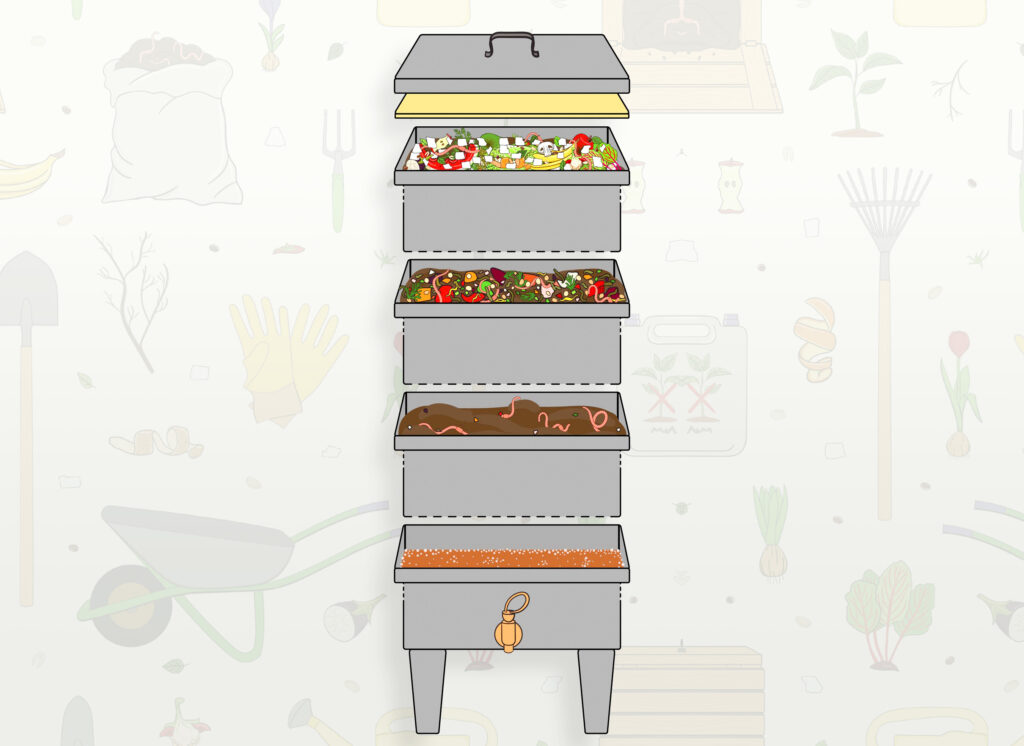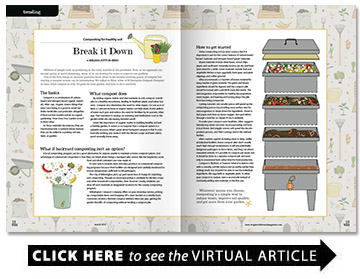Break it Down
Composting for healthy soil
BY Melissa Sutton-Seng

Millions of people took up gardening in the early months of the pandemic. Now, as we approach our second spring of social distancing, many of us are looking for ways to improve our gardens.
One of the first things an amateur gardener hears about is the wonder-working power of compost but starting a compost system can be intimidating. We talked to Riley Alber of Wilmington Compost Company to learn what compost is, why it’s good for your garden, and how to do it correctly.
The basics
Compost is a combination of carbon-based and nitrogen-based organic materials, Alber says. Organic means things that were once living; it is good to avoid synthetic herbicides and pesticides altogether. (Check out last month’s article on organic gardening, “How Does Your Garden Grow?” to learn why.)
As these materials decompose, they are transformed into a nutrient-dense mixture that can be added to a potting soil mix, lawn, or garden.
What compost does
By adding organic matter and vital nutrients to soil, compost contributes to a healthy microbiome, leading to healthier plants and better harvests. Compost also diminishes the need for other inputs. On one acre of land, a 1 percent increase in organic matter can help retain 25,000 gallons of water each year and reduce the need for fertilizer by 40 percent, Alber says. That translates to savings on watering and fertilization costs in the garden while also decreasing harmful runoff.
Given the importance of organic matter in building healthy soil and a healthy garden, it comes as no surprise that a compost system is a valuable resource. What’s great about backyard compost is that it costs basically nothing; you make it with the kitchen scraps and lawn debris you’d normally throw away.
What if backyard composting isn’t an option?
A local composting program can be a good alternative for anyone unable to maintain a home compost system. One advantage of commercial composters is that they can break down things a backyard pile cannot, like the bioplastics some food and drink containers are now made of.
It’s also safe to include meat and dairy products in commercial composting programs because their facilities are designed and carefully monitored to ensure temperatures sufficient to kill pathogens.
The City of Wilmington picks up yard waste free of charge for mulching and composting. Though no municipal pickup is available for kitchen scraps and other household compostables, New Hanover County residents can drop off such materials at designated locations for the county composting program.
Wilmington Compost Company offers on-your-doorstep service, picking up compostable items and dropping off a clean bucket on a weekly basis. Customers receive a finished compost delivery twice per year, getting the garden benefits of composting without tending a compost pile.
How to get started
Home composting isn’t an exact science, but it is important to aim for the correct balance of carbon-based “brown” materials and nitrogen-based “green” materials.
Brown materials include dead leaves, wood chips, paper, and cardboard. Generally, browns are dry and have been dead for a while. Green materials include fruit and vegetable kitchen scraps, eggshells, fresh grass and plant clippings, and coffee grounds.
Alber recommends 2-3 buckets of brown material for every bucket of green material. The green and brown ingredients should be layered, and the compost pile should be turned with a pitchfork every few weeks. The microorganisms responsible for healthy decomposition need oxygen, and layering and turning keeps the pile from becoming compacted.
Cutting materials into smaller pieces will speed up the composting process by providing more surface area for microorganisms to break down the ingredients. Shred or tear paper and chop up dense veggies. Run yard debris through a mulcher or chipper if one is available.
To make your compost even healthier, Alber suggests introducing native microbes by incorporating soil from a local forest. Red wiggler worms will speed the decomposition process, and their castings enrich the mixture further.
Alber cautions against including meat or dairy. Unlike at industrial facilities, home compost piles don’t usually reach high enough temperatures to kill any potentially dangerous pathogens in those items, and they can attract unwanted animals. It is possible to compost pet waste, but it should be done in a separate compost pile and used only in ornamental beds rather than for food production.
Compost is finished, or “mature,” when it is dark in color with a crumbly, soil-like texture and an earthy (rather than rotting) smell. You shouldn’t be able to see the individual ingredients, like eggshells or vegetable peels. To allow your compost to mature, start a second pile instead of constantly adding new materials to the first one.
Whatever means you choose, composting is a simple way to reduce waste, improve soil quality, and get more from your garden.
